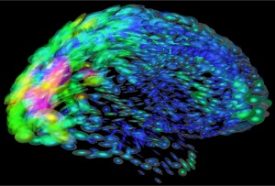The ups and downs of a teenage brain
New research shows IQ, brain can change during adolescence
One thing is certain about teenagers: Things change, inside and out. That includes teen brains and mental abilities, according to a team of neuroscientists from London. The brain researchers recently reported that a person’s IQ may rise or fall and regions of the brain may change during the teenage years.
An IQ, or intelligence quotient, measures a person’s ability to think and reason. Many researchers had believed it never changes for an individual. If that were true, then your IQ at age 10 would be the same as your IQ at 40. The new study shows that’s not the case, a person’s IQ can change, Richard Haier told Science News. Haier, a neuroscientist at the University of California, Irvine, called the new results “extremely interesting.”

A few years later, in 2007 and 2008, the participants returned to the lab. Like the first time, the scientists tested the teens’ IQs and used an MRI to see their brains. But when Price compared the old and new results, she was shocked. Many of the teenagers’ IQs had changed dramatically over the years. One person had lost 18 IQ points; another had gained 21. Some people with high IQs on the first test had even higher IQs on the second. And some low-scoring individuals saw their scores fall even further.
Price suspected maybe the teens were concentrating more or less on the second test compared with the first, and that’s why they scored differently. But when she looked the brain scans, she discovered more surprises. The brains of teens whose scores went up on verbal IQ tests had more gray matter than before in an area called the left motor cortex, which is involved in speaking. She found other connections between increased IQ scores and gray matter, which is tissue containing brain cells.
“We therefore concluded that the fluctuations were meaningful changes in IQ, not measurement error,” Price told Science News.
Knowing that people’s IQs change over the years might be useful in particular for the teachers whose students are changing so quickly. Scientists don’t know why the teens’ IQs and brains changed so much, but Haier told Science News that growing interests — like socializing and sports — might play a role.
“So much is going on in the teenage years,” he said.







